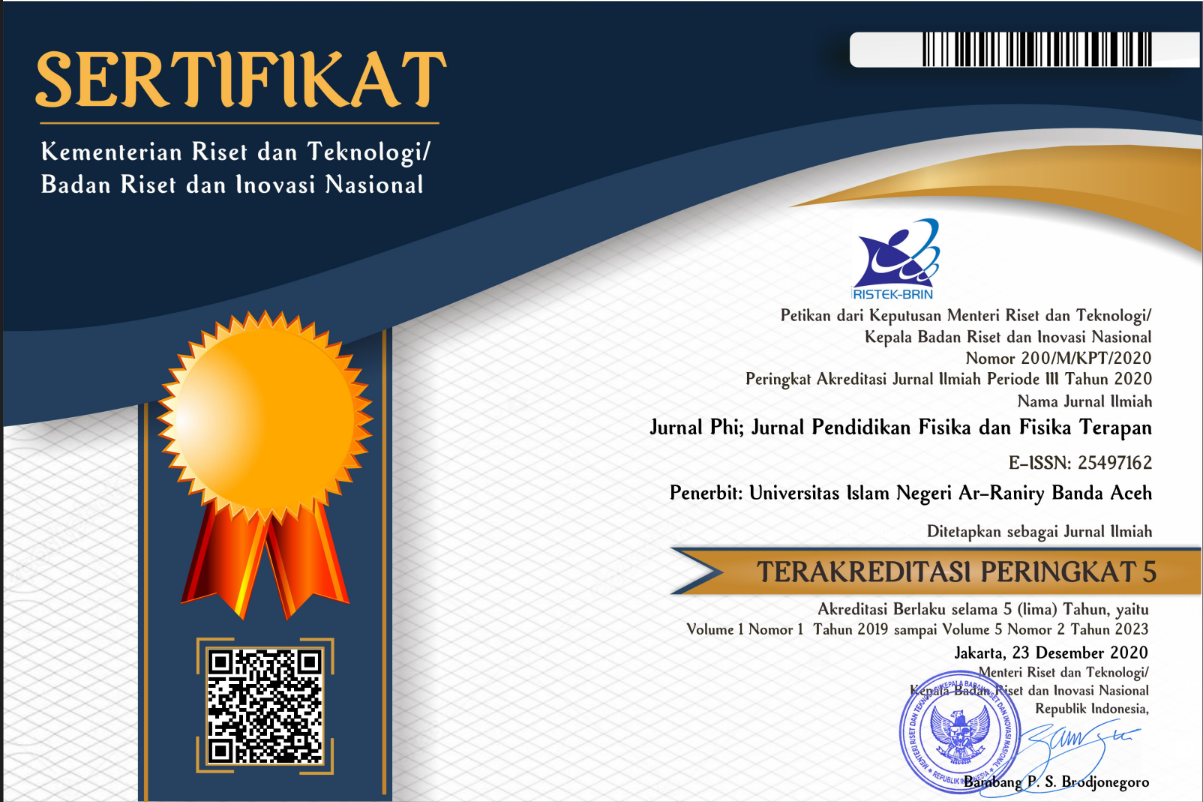Project Based Learning in Science Education Research in Indonesia: A Bibliometric Analysis
Abstract
Keywords
Full Text:
PDFReferences
Andriani, RKD, Qurotul, EA, & Tanu, TW (2023). The effect of project-based learning models to improve HOTS skills in science in elementary schools. Journal of Educational Science Research , 16 (1), 60–71.
Arikunto, S. (2010). Research Procedures: A Practical Approach . Rineka Cipta.
Barak, M. (2012). From “doing” to “doing with learning”: reflections on efforts to promote self-regulated learning in technology projects in secondary schools. International Journal of Science Education , 34 (4), 451–468. https://doi.org/10.1080/03043797.2012.658759
Bell, S. (2010). Project-Based Learning for the 21st Century: Skills for the Future. Clearing House: A Journal of Educational Strategies, Issues and Ideas , 83 (2), 39–43. https://doi.org/10.1080/00098650903505415
Belland, BR (2020). Project-based learning in the STEM classroom: Educational practice and research. In D. B. Krajcik & R. B. Edelson (Eds.). Learning and Teaching in the 21st Century , 23–50.
Bender, W.N. (2012). Project-Based Learning Differentiated Instruction for the 21st Century . SAGE Publications.
Capraro, R.M., Capraro, M.M., & Morgan, J. (2022). Elementary teachers' perceptions of project-based learning in STEM education: The influence of professional development. International Journal of STEM Education , 9 (1), 42.
Chin, C., & Chia, L.-G. (2006). Problem-Based Learning: Using Structured Problems III in Biology Project Work. Science Education , XC (1), 44–67.
Dewi, IS, & Jauhariyah, MNR (2021). Bibliometric Analysis of the Implementation of STEM-Based Physics Learning in 2011-2021. Scientific Journal of Physics Education , 5 (3), 368–387.
Fitriani, A., Sari, M., & Hartono, T. (2021). Technology in PBL: An Experimental Study in Science Classroom. Journal of Technology Education , 15 (2), 89–101.
Gültekin, M. (2016). The Effect of Project-Based Learning on Learning Outcomes of Social Studies Courses in Grade 5 Elementary Education. Educational Research and Review , 10 (9), 1237–1248.
Hanif, M., Hussain, R. M., & Ghazali, Z. (2021). Effects of project-based learning on students' achievement: A meta-analysis. Review of Educational Research , 34 , 100413.
Hasni, A., Bousadra, F., Belletête, V., Benabdallah, A., Nicole, M.-C., & Dumais, N. (2016). Trends in research on project-based science and technology teaching and learning at K–12 levels: a systematic review. Studies in Science Education, 52(2), 199–231. http://dx.doi.org/10.1080/03057267.2016.1226573
Herro, D., & Quigley, C. (2021). Exploring the impact of STEAM-based projects on student creativity and engagement. International Journal of STEM Education , 8 (1), 12.
Holbrook, J., & Rannikmae, M. (2009). The meaning of scientific literacy. International Journal of Environmental & Science Education , 4 (3), 275–288.
Konu Kadirhanogullari, M. & Ozay Kose, E. (2024). Project-based learning in science education: A bibliometric network analysis. International Journal on Studies in Education (IJonSE), 6(1), 85-108. https://doi.org/10.46328/ijonse.200
Krajcik, J. S., & Blumenfeld, P. C. (2006). Project-Based Learning. In The Cambridge Handbook of the Learning Sciences , 317–333.
Kurniawan, D. (2023). Analysis of Challenges in Implementing PBL in Secondary Schools. Indonesian Journal of Education , 25 (1), 67–80.
Larmer, J., & Mergendoller, J.R. (2015). Project-Based Learning: Teaching Students to Think Critically in the 21st Century. Buck Institute of Education .
Lin, S., Tan, Z., & Guo, W. (2023). A bibliometric analysis of project-based learning research in and outside mainland China. International Journal of Engineering Education, 39 (2), 123-147.
Maritsa, A., Salsabila, UH, Wafiq, M., Anindya, PR, & Ma'shum, MA (2021). The Influence of Technology in the World of Education. Al-Mutharahah: Journal of Research and Social Religious Studies , 18 (2), 91–100. https://doi.org/10.46781/al-mutharahah.v18i2.303
Miller, E.C., & Krajcik, J.S. (2019). Promoting deep learning through project-based learning: design issues. Disciplinary and Interdisciplinary Science Education Research , 1 (1), 1–10. https://doi.org/10.1186/s43031-019-0009-6
Moto, MM (2019). The Influence of Using Learning Media in the World of Education. Indonesian Journal of Primary Education , 3 (1), 20–28. https://doi.org/10.17509/ijpe.v3i1.16060
Nandiyanto, ABD, Biddinika, MK, & Triawan, F. (2020). How bibliographic datasets describe the decline in the number of scientific publications from Indonesia. Indonesian Journal of Science and Technology , 5 (1), 154–175.
Okta, F. (2022). Bibliometric analysis: Science Technology and Society (STS) in science learning (Undergraduate Thesis) . UIN Raden Intan Lampung.
Panjaitan, J., Simangunsong, IT, & Sihombing, HMB (2020). Implementation of Project Based Learning (PjBL) Based on HOTS to Create Innovative Learning Media. Journal of Physics Education , 9 (2), 79–90.
Putri, NAM (2021). Bibliometric Analysis of Learning Problem Solving in Physics (Undergraduate thesis). In UIN Raden Intan Lampung (Vol. 35, Issue September 2019). UIN Raden Intan Lampung.
Rukminingsih, Adnan, G., & Latief, MA (2022). Educational Research Methods: Quantitative Research, Qualitative Research, Classroom Action Research (Issue July). Erhaka Utama.
Santoso, I. (2021). Development of PBL Modules for Distance Learning. Journal of Curriculum Development , 18 (3), 45–59.
Sari, N. (2020). Project Based Learning and Critical Thinking Skills: An Experimental Study. Journal of Modern Education , 10 (1), 12–20.
Sugiyono. (2013). Combination Research Methods . Alpabeta.
Syukri, IIF, Rizal, SS, & Al Hamdani, MD (2019). The Influence of Religious Activities on the Quality of Education. Journal of Islamic Education Research , 7 (1), 17–34. https://doi.org/10.36667/jppi.v7i1.358
Wayan, NR, Kusmaryatni, N., & Rediani, N. (2017). Project-Based Learning Model, Creativity and Student Learning Outcomes. JPI (Jurnal Pendidikan Indonesia) , 6 (1), 60–71. https://doi.org/10.23887/jpi-undiksha.v6i1.9059
Wijaya, R., Hartono, E., & Dewi, S. (2022). Teachers' Barriers in Implementing Project-Based Learning. Journal of Educational Innovation , 14 (4), 95–110.
Yasin, RS, Dwi, RP, & Baptista, G. (2020). Project-Based Learning: A New Breakthrough in Training HOTs on Students' Speaking Skills. Briliant: Journal of Research and Conceptual , 5 (4), 721–730. https://doi.org/10.28926/briliant.v5i4.542
Zohar, A., & Dori, Y. J. (2003). Higher-Order Thinking Skills and Low-Achieving Students: Are They Mutually Exclusive? Journal of the Learning Sciences , 12 , 145–181. https://doi.org/http://dx.doi.org/10.1207/S15327809JLS1202_1
DOI: http://dx.doi.org/10.22373/p-jpft.v11i2.29885
Refbacks
- There are currently no refbacks.

This work is licensed under a Creative Commons Attribution-NonCommercial 4.0 International License.
OFFICE:
Gedung Fakultas Tarbiyah dan Keguruan, Universitas Islam Negeri Ar-Raniry Banda Aceh. Jalan Syeikh Abdul Rauf, Syiah Kuala, Kopelma Darussalam, Syiah Kuala, Kota Banda Aceh, Aceh, 23111. email: [email protected]
This work is licensed under a Creative Commons Attribution-ShareAlike 4.0 International License




.png)
1.png)
.png)

.png)





